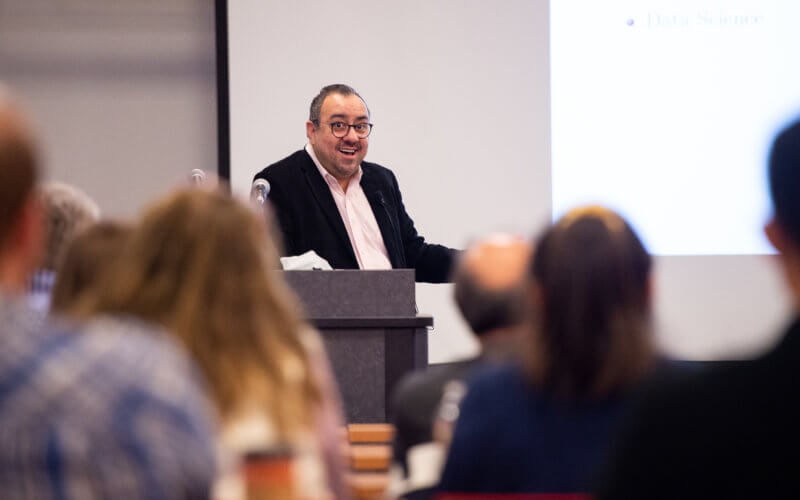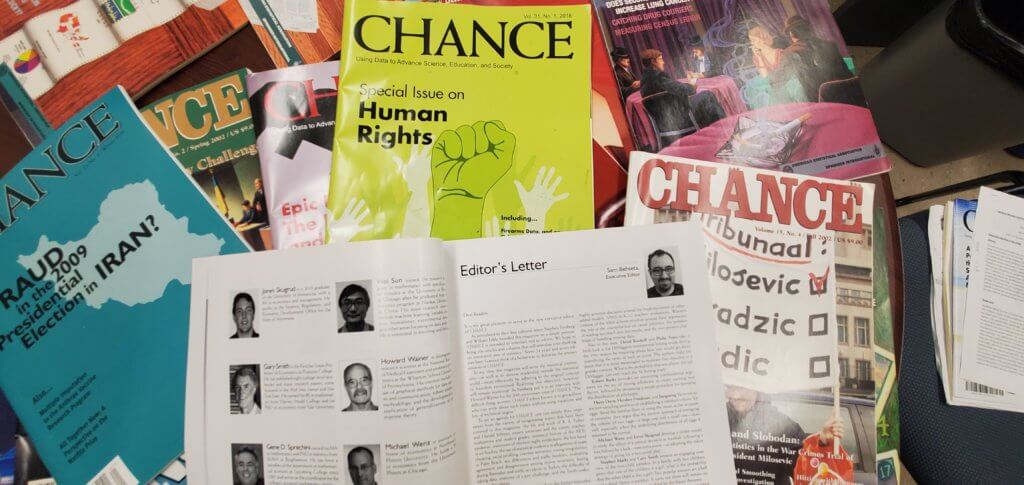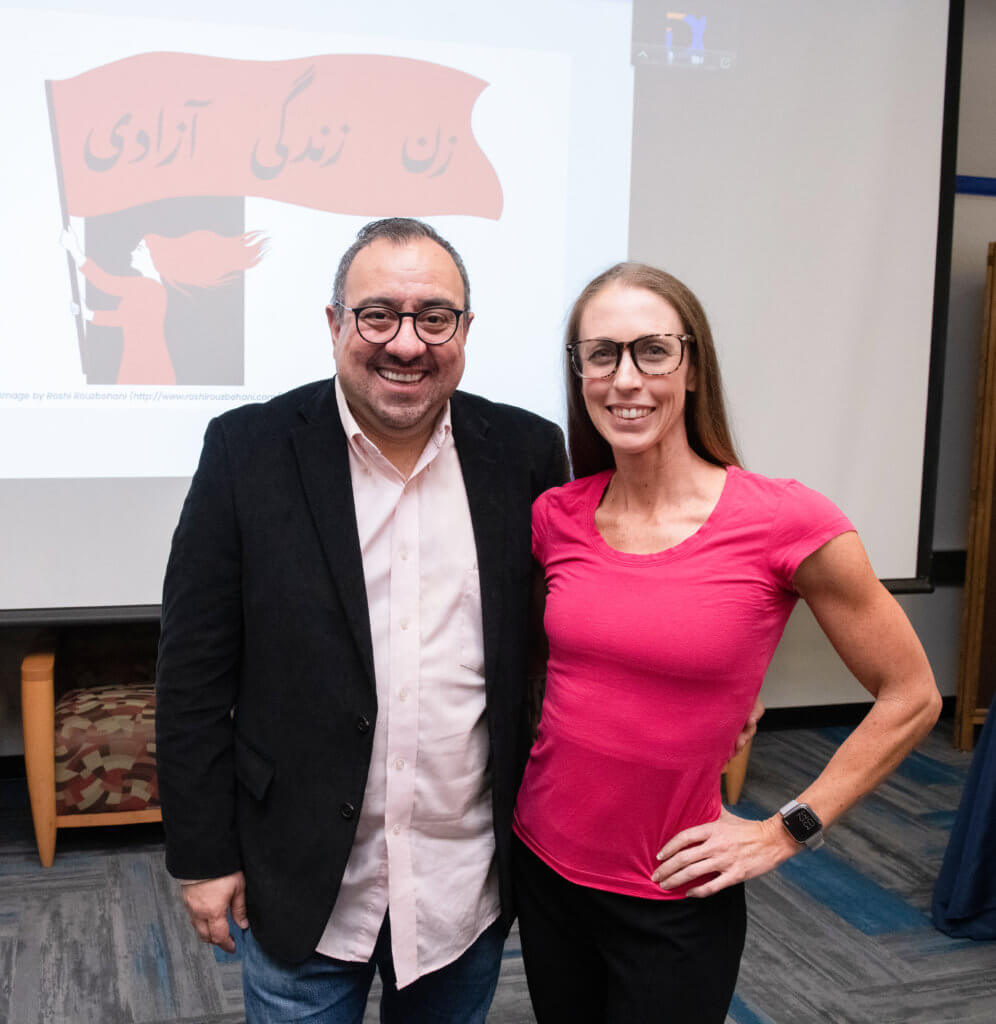
Cal State Fullerton’s 2022 Outstanding Professor Sam Behseta delivered a key message on why data science matters: “Don’t let people lie to you with numbers. It’s very easy to do.”
In his Nov. 7 Outstanding Professor Lecture on “Statistical Thinking and Big Data Explorations,” Behseta relayed that there is a critical need for statistical literacy in society due to the increasing volume of data.
Behseta, professor of mathematics, also stressed the need to prepare and train students and others to understand, analyze and make sense out of data.
“Data and numbers are everywhere,” said Behseta, a statistician who joined CSUF in 2008 and is director of the Center for Computational and Applied Mathematics. “We have work to do to educate people about data.”
During the question-and-answer session at the end of his talk, Behseta discussed the idea of starting a data science undergraduate degree program at Cal State Fullerton. He then encouraged colleagues across disciplines to rally in support of taking the first steps to make it happen.
Why Data Science?
Data science deals with mechanisms associated with the generation, collection, summarization and analysis of data. This area of study borrows strength from multiple disciplines, including statistics, mathematics, computer science, business, public health, among others.
The popularity and growth of data science methods is due to the overwhelming increase in the three “V’s” of big data, Behseta said. These “V’s” are volume, referring to the immense magnitude and size of data; velocity, referring to the accelerating speed of generating data; and variety, pointing to the incredibly diverse nature and formats of data.
Behseta, a Fellow of the American Statistical Association, shared real-life examples of how data is analyzed and can produce interesting discoveries, as well as the importance of rethinking how data is gathered. He explained methods used by late 19th-century English statisticians of using parents’ heights to predict an adult offspring’s height.
“The first question to ask is, ‘What is the source of the data and how reliable is the data set?’”
Behseta’s point: “The data was problematic. But when analyzing data, statistical thinking makes it possible to develop a critical lens for examining the reports that are based on numbers.”
He also demonstrated the advantages of adopting “statistical thinking” by analyzing a complex data set created by the National Alzheimer’s Coordinating Center, as well as data generated through a neurophysiological experiment.
Behseta shared how as a doctoral student at Carnegie Mellon University, where he earned his doctorate in statistics in 2003, he was interested in theoretical statistics. But his adviser convinced him to try applied research in neuroscience. Ever since, his main research area is statistics in neuroscience.
“Studying computational and numerical aspects of the brain stuck with me,” said Behseta, who has worked on grant-funded big data research projects related to neuroscience alongside CSUF collaborators in biological science and public health.
“I discovered how deep, complex and utterly exciting computational neuroscience can be.”

A Statistics Career by CHANCE
Behseta told his personal story about being an undergraduate mathematics major at the National University of Iran. One day, he picked up a copy of CHANCE magazine, a nontechnical magazine highlighting statistical practice, by happenstance.
“The journal caught my eye,” he said.
After reading it cover to cover, he became hooked on statistics.
Following his immigration to the U.S. almost 30 years ago from Tehran, he studied statistics at San Diego State University and earned a master’s degree in the discipline.
Behseta then attended Carnegie Mellon for his doctorate, the institute of the magazine’s editors who he had befriended. He had a full circle moment when, from 2011-14, he became the magazine’s executive editor, and today, serves as an advisory editor.
“It’s been an incredible journey; one day I’m flipping through the magazine, and the next day I’m editing the magazine,” he said.
Behseta’s message: Anything is possible through “hard work and passion for what you are doing,” and maybe even chance. As a young man in Iran, he later relayed that he had two choices: pass the national exam and attend university or fight in the Iran-Iraq War.
“I can actually say that math saved my life. Was it by chance? Millions of people died in that meaningless war.”
Transforming Students’ Lives
CSUF President Fram Virjee, in introducing Behseta, also spoke about his encounter with CHANCE magazine.
“I find that little, if anything, that happens to us is by chance. Most often, what we see as chance is simply intention wrapped up as direction. Chance has a way of guiding us to our calling. And this chance led him here — to our community.”
Virjee added that Behseta’s dedication to transform chance into change is potent.
“With a keen understanding of how students learn best, he transforms each classroom opportunity, lecture, office hour and classroom participation into an individualized lesson for each student,” Virjee said. “He believes in the critical role that learning through participation can play in communicating ideas, specifically in statistical and mathematical disciplines.”

Behseta remarked that the most rewarding part of professorship is mentoring students and fostering their academic and personal success. He mentioned that his former students are data scientists, high school statistics teachers and university faculty, including CSUF colleague and research collaborator Valerie Poynor, now an associate professor of mathematics.
Poynor later commented about her outstanding mentor: “It’s a good thing I stumbled upon Sam or vice versa. Chance had a hand in it. Talk about people who do randomly come into your life and literally change your entire trajectory. Sam, you were that person for me. Your life story is incredible and lots of happenstance and chance are part of it.
“There’s another element to becoming a great person other than chance,” she noted, referring to the book, “Outliers,” by Malcolm Gladwell. “That is, you also have to have the greatness within you to go with that chance.”